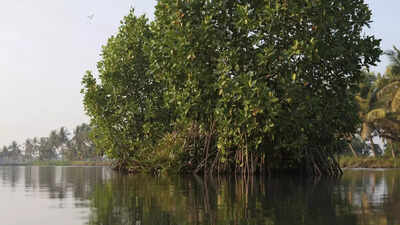- News
- India News
- World Environment Day: New schemes launched to protect and conserve wetlands and mangrove ecosystem
Trending Topics
World Environment Day: New schemes launched to protect and conserve wetlands and mangrove ecosystem

NEW DELHI: Environment minister Bhupender Yadav on World Environment Day on Monday launched two new schemes, Amrit Dharohar Yojana and Mishti Yojana, to ensure conservation of India’s wetlands of international importance (Ramsar sites) and reviving as well as protecting the mangrove ecosystem of the country, respectively.
Besides, a compendium of LiFE (lifestyle for environment) practices around the world - Mindful Living - carrying dos and don'ts for sustainable living, was also released on the occasion. The compendium is jointly brought out by the UNDP and the Niti Aayog, underlining the need for responsible production and consumption across the globe as an important tool to deal with the challenges of climate change.
The ‘Amrit Dharohar’ initiative was announced in this year’s Budget to promote the unique conservation values of Ramsar sites. The scheme to conserve the wetland ecosystem will involve local communities, based on the philosophy of conservation through people’s participation, and prosperity through conservation.
Referring to the launch of the scheme, Prime Minister Narendra Modi later in his video message elaborated that the Ramsar sites will also become the center of eco-tourism and a source of green jobs for thousands of people.
The Mishti - ‘Mangrove Initiative for Shoreline Habitats and Tangible Incomes’ - scheme was also announced in the Budget 2023-24 to promote and conserve mangroves which are unique and natural ecosystem having very high biological productivity and carbon sequestration potential, besides working as a bio-shield.
The programme will cover approximately 540 sq km area across nine coastal States and four UTs in five years (2023-2028). Besides creating an estimated carbon sink of 4.5 million tons of carbon, the scheme will also create potential areas for nature tourism and livelihood potential for local communities.
The World Environment Day this year was organised by the environment ministry with a thrust on the Mission LiFE. A comprehensive and non-exhaustive list of 75 individual LiFE actions have already been identified across seven themes – save water, save energy, reduce waste, reduce e-waste, reduce single-use plastics, adopt sustainable food systems, and adopt healthy lifestyles.
Besides, a compendium of LiFE (lifestyle for environment) practices around the world - Mindful Living - carrying dos and don'ts for sustainable living, was also released on the occasion. The compendium is jointly brought out by the UNDP and the Niti Aayog, underlining the need for responsible production and consumption across the globe as an important tool to deal with the challenges of climate change.
The ‘Amrit Dharohar’ initiative was announced in this year’s Budget to promote the unique conservation values of Ramsar sites. The scheme to conserve the wetland ecosystem will involve local communities, based on the philosophy of conservation through people’s participation, and prosperity through conservation.
Referring to the launch of the scheme, Prime Minister Narendra Modi later in his video message elaborated that the Ramsar sites will also become the center of eco-tourism and a source of green jobs for thousands of people.
The Mishti - ‘Mangrove Initiative for Shoreline Habitats and Tangible Incomes’ - scheme was also announced in the Budget 2023-24 to promote and conserve mangroves which are unique and natural ecosystem having very high biological productivity and carbon sequestration potential, besides working as a bio-shield.
The programme will cover approximately 540 sq km area across nine coastal States and four UTs in five years (2023-2028). Besides creating an estimated carbon sink of 4.5 million tons of carbon, the scheme will also create potential areas for nature tourism and livelihood potential for local communities.
The World Environment Day this year was organised by the environment ministry with a thrust on the Mission LiFE. A comprehensive and non-exhaustive list of 75 individual LiFE actions have already been identified across seven themes – save water, save energy, reduce waste, reduce e-waste, reduce single-use plastics, adopt sustainable food systems, and adopt healthy lifestyles.

About the Author
Vishwa MohanVishwa Mohan is Senior Editor at The Times of India. He writes on environment, climate change, agriculture, water resources and clean energy, tracking policy issues and climate diplomacy. He has been covering Parliament since 2003 to see how politics shaped up domestic policy and India’s position at global platform. Before switching over to explore sustainable development issues, Vishwa had covered internal security and investigative agencies for more than a decade.
Start a Conversation
FOLLOW US ON SOCIAL MEDIA
FacebookTwitterInstagramKOO APPYOUTUBE










